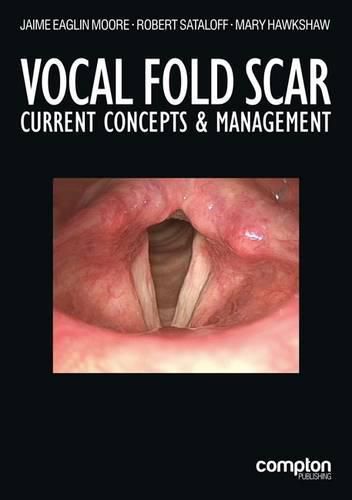Readings Newsletter
Become a Readings Member to make your shopping experience even easier.
Sign in or sign up for free!
You’re not far away from qualifying for FREE standard shipping within Australia
You’ve qualified for FREE standard shipping within Australia
The cart is loading…






This title is printed to order. This book may have been self-published. If so, we cannot guarantee the quality of the content. In the main most books will have gone through the editing process however some may not. We therefore suggest that you be aware of this before ordering this book. If in doubt check either the author or publisher’s details as we are unable to accept any returns unless they are faulty. Please contact us if you have any questions.
Vocal fold scar remains one of the most demanding and, in some ways, frustrating challenges of laryngology and voice therapy. Treatments for this complex condition are inconsistent and often produce suboptimal results. Yet, while hopes for full recovery remain slim, surgical methods and improving technologies, along with improved therapy techniques, have combined to yield better and better outcomes; and further advances are on the horizon. In this new book, Drs Moore and Sataloff have collaborated with world leaders in laryngology and speech-language pathology to compile the latest information on the pathophysiology of vocal fold scar, treatments, procedures and, importantly, look at the promising directions in research. The authors introduce the various causes and sequelae of scar, examine anatomy and pathophysiology, and take the reader through diagnostic procedures. Thereafter, they review pre-operative therapy options and providing practical guidance on surgical methods including medialization, techniques for freeing the epithelium, management of sulcus, grafting, and the use of lasers.The book discusses tissue engineering and newer treatment options, including epidermal growth factor (EGF) and transforming growth factor-beta 1 (TGF-beta1). The book summarises the state of the art in diagnosis and treatment of vocal fold scar and should be valuable for any clinician who cares for the patient with this vexing problem.
$9.00 standard shipping within Australia
FREE standard shipping within Australia for orders over $100.00
Express & International shipping calculated at checkout
This title is printed to order. This book may have been self-published. If so, we cannot guarantee the quality of the content. In the main most books will have gone through the editing process however some may not. We therefore suggest that you be aware of this before ordering this book. If in doubt check either the author or publisher’s details as we are unable to accept any returns unless they are faulty. Please contact us if you have any questions.
Vocal fold scar remains one of the most demanding and, in some ways, frustrating challenges of laryngology and voice therapy. Treatments for this complex condition are inconsistent and often produce suboptimal results. Yet, while hopes for full recovery remain slim, surgical methods and improving technologies, along with improved therapy techniques, have combined to yield better and better outcomes; and further advances are on the horizon. In this new book, Drs Moore and Sataloff have collaborated with world leaders in laryngology and speech-language pathology to compile the latest information on the pathophysiology of vocal fold scar, treatments, procedures and, importantly, look at the promising directions in research. The authors introduce the various causes and sequelae of scar, examine anatomy and pathophysiology, and take the reader through diagnostic procedures. Thereafter, they review pre-operative therapy options and providing practical guidance on surgical methods including medialization, techniques for freeing the epithelium, management of sulcus, grafting, and the use of lasers.The book discusses tissue engineering and newer treatment options, including epidermal growth factor (EGF) and transforming growth factor-beta 1 (TGF-beta1). The book summarises the state of the art in diagnosis and treatment of vocal fold scar and should be valuable for any clinician who cares for the patient with this vexing problem.